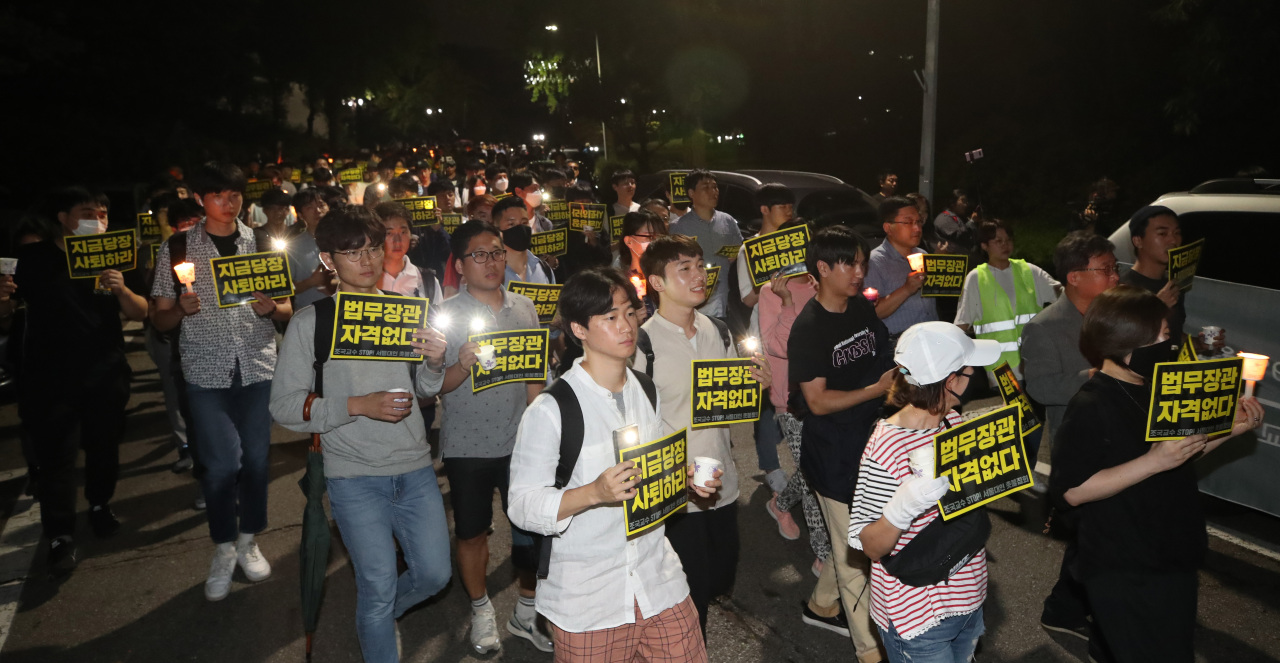The impact of the government’s appointment of Cho Kuk as justice minister is likely to be seen at next year’s general election, as the younger generation and moderate voters are showing signs of turning away from the ruling Democratic Party of Korea, political analysts said Wednesday.
Amid fierce resistance from opposition parties and the public’s disapproval, President Moon Jae-in appointed Cho as justice minister Monday.
Cho had been portrayed as a figure on the front line of progressive policies despite his elite background.
But suspicions of irregularities in the college admission of Cho’s daughter involving Cho’s spouse -- which Cho has denied having known at the time -- have sparked a sense of betrayal among the public.
 |
Seoul National University students take part in their third candlelight vigil Monday, criticizing the Moon government for appointing Cho Kuk as the justice minister. (Yonhap) |
Worsening the outrage were privileges Cho’s daughter allegedly received in the process of preparing for university admissions and as an undergrad and graduate student.
Cho, a law professor at Seoul National University, his alma mater, now faces vehement opposition from Seoul National University students.
Some 500 SNU students held their third candlelight vigil Monday, criticizing the Moon government for appointing Cho despite opposition from the younger generation. They said “justice and fairness in South Korea have died.”
According to a SNU News survey, 73.9 percent of SNU students were opposed to Cho’s nomination, while those in support of Cho stood at 16.9 percent.
The survey was conducted on 644 SNU undergraduate students from Sept. 1-6.
“It is difficult to predict the impact the appointment would have on the general election. The public’s criticism was harsher than expected. But this does not mean that Democratic Party supporters or moderates will vote for the Liberty Korea Party,” Park Sang-byoung, a political analyst and professor at Inha University Graduate School of Policy Science, told The Korea Herald.
In a sign of dwindling support among past supporters of the Democratic Party, influential civic group Citizens’ Coalition for Economic Justice issued a statement last week calling on Cho to voluntarily resign over the speculations raised against him and inconsistency in his actions and words.
In the latest survey by local pollster Real Meter, of the people who classified themselves as politically “moderate” 55.1 percent replied the appointment was a “wrong” decision. Support among that group totaled 41.7 percent.
“If Cho makes progress in judiciary and prosecutorial reform (before the election), it will be advantageous for the Democratic Party. But if not, voters will render a verdict,” Park said.
“Whether the Liberty Korea Party is able to overhaul its leadership will be key in next year’s general election. With the current leadership, it will be difficult to garner votes,” Park added. The main opposition has failed to boost its support rating amid public opposition against Cho.
“The prosecution is looking into Cho’s private equity investments, but the public is more interested in college admissions. This is a volatile topic here. It is an issue that most people have experienced, is experiencing or will experience both as a student and as a parent. This will stick around at least until the end of the year,” Shin Yul, a political science professor at Myongji University, said.
By Kim Bo-gyung (
lisakim425@heraldcorp.com)








